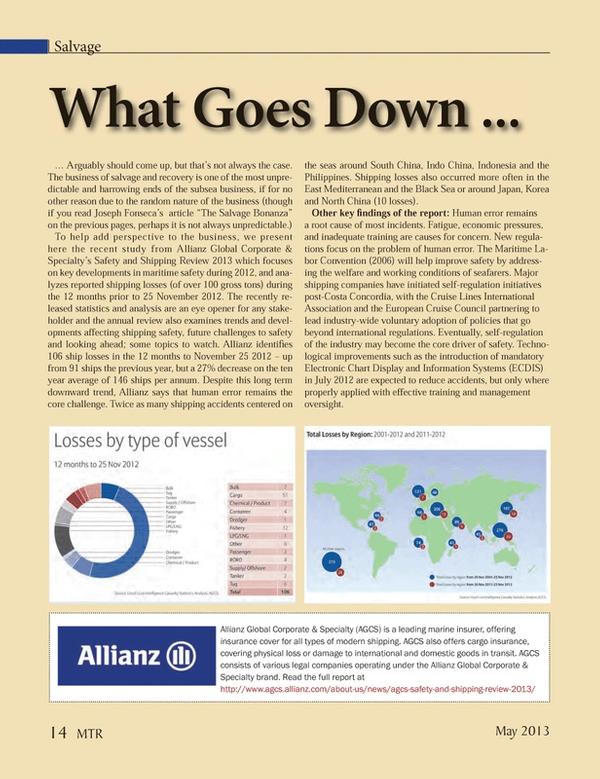
What Goes Down ...
... Arguably should come up, but that’s not always the case. The business of salvage and recovery is one of the most unpredictable and harrowing ends of the subsea business, if for no other reason due to the random nature of the business (though if you read Joseph Fonseca’s article “The Salvage Bonanza” on the previous pages, perhaps it is not always unpredictable.)
To help add perspective to the business, we present here the recent study from Allianz Global Corporate & Specialty’s Safety and Shipping Review 2013 which focuses on key developments in maritime safety during 2012, and analyzes reported shipping losses (of over 100 gross tons) during the 12 months prior to 25 November 2012. The recently released statistics and analysis are an eye opener for any stakeholder and the annual review also examines trends and developments affecting shipping safety, future challenges to safety and looking ahead; some topics to watch. Allianz identifies 106 ship losses in the 12 months to November 25 2012 – up from 91 ships the previous year, but a 27% decrease on the ten year average of 146 ships per annum. Despite this long term downward trend, Allianz says that human error remains the core challenge. Twice as many shipping accidents centered on the seas around South China, Indo China, Indonesia and the Philippines. Shipping losses also occurred more often in the East Mediterranean and the Black Sea or around Japan, Korea and North China (10 losses).
Other key findings of the report: Human error remains a root cause of most incidents. Fatigue, economic pressures, and inadequate training are causes for concern. New regulations focus on the problem of human error. The Maritime Labor Convention (2006) will help improve safety by addressing the welfare and working conditions of seafarers. Major shipping companies have initiated self-regulation initiatives post-Costa Concordia, with the Cruise Lines International Association and the European Cruise Council partnering to lead industry-wide voluntary adoption of policies that go beyond international regulations. Eventually, self-regulation of the industry may become the core driver of safety. Technological improvements such as the introduction of mandatory Electronic Chart Display and Information Systems (ECDIS) in July 2012 are expected to reduce accidents, but only where properly applied with effective training and management oversight.
Allianz Global Corporate & Specialty (AGCS) is a leading marine insurer, offering insurance cover for all types of modern shipping. AGCS also offers cargo insurance, covering physical loss or damage to international and domestic goods in transit. AGCS consists of various legal companies operating under the Allianz Global Corporate & Specialty brand. Read the full report at
http://www.agcs.allianz.com/about-us/news/agcs-safety-and-shipping-review-2013/
(As published in the May 2013 edition of Marine Technologies - www.seadiscovery.com)
Read What Goes Down ... in Pdf, Flash or Html5 edition of May 2013 Marine Technology
Other stories from May 2013 issue
Content
- What Goes Down ... page: 14
- MHI to Build for PGS page: 18
- Exploring the Abyss page: 20
- Unmanned Surface Vessels page: 24
- Unmanned Surface Vessels: Wave Glider SV3 page: 32
- Unmanned Surface Vessels: C-Stat Mobile Buoy USV System page: 34
- Ocean Business Sold page: 36
- Partrac, Rockland Scientific Announce Partnership page: 36
- Ashtead Increases Sonardyne 6G Rental Pool page: 36
- Seatronics Invests in Teledyne TSS Products page: 37
- Geomatrix Buys Applied Acoustics’ Energy Source page: 37
- New Gyro Changeover System page: 38
- Sonardyne Aids NOC page: 38
- EvoLogics Showcase Latest Developments page: 39
- Forum Subsea Rentals Adds iXBlue Systems page: 40
- DP-PHINS Adds to Acoustics page: 40
- Kongsberg to Offer AUV Rentals page: 41
- Fugro Upgrades DeepWorks page: 41
- Teledyne Moves Portfolio to Odom page: 42
- Ashtead Technology Launches Electric Dredge page: 42
- Navigation, Tide and Weather Information via Twitter page: 43


